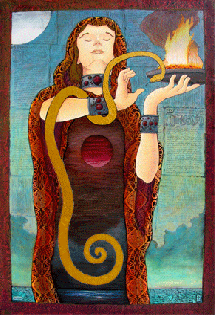Holistic Counseling
I use a holistic approach to counseling. But what does that mean? I find people tend to assume their own definitions for the term holistic. To me, holistic counseling means:
Multiple Approaches
When you are having an issue that you want to change, doesn’t it make sense to try a variety of approaches? I work with my clients to do this. Some clients will want to try just one or two things at a time — that’s usually fine, as therapy is a collaboration.
Body, Mind, and Spirit
Body can refer to nutrition, exercise, sleep, herbs, alternative medical approaches (like acupuncture), and medications. I frequently will suggest taking up one of these practices or consulting with practitioners in these given fields.
Mind refers to any of the many approaches to counseling or healthful mental practices. In my case I most often mean cognitive behavioral therapy (looking at how thoughts effect feelings), general supportive listening, meditation, and hypnotic or guided meditation approaches.
Spirituality is critical to mental health and positive worldview. I do not mean that you have to be religious — an atheist is spiritual if, for example, she feels connected to the wider world and shares love and compassion with groups of people. To me spirituality is about connection to a greater something. It’s about a push to transcend your personal boundaries. Its about a feeling of belonging. Its about having a sense of meaning and purpose. Many religions and other practices can therefore supply this critical mental health component. I will usually inquire about client’s belief systems and ask them to verbalize what is important to them. I’ll then look for opportunities to bring those values into use in life. This is most often key in depression and anxiety. Sometimes people will be doing everything they “should” be doing — and yet not feel happy. Reconnecting with a sense of meaning and purpose can do wonders.
I have a PowerPoint slideshow that goes into this in some more detail.
When Practical, Trying Natural Approaches First
I don’t believe in turning to psychiatric medications for everything. Many ailments — especially conditions like stress and anxiety — can be partially or totally treated with life-style changes, counseling, meditation, exercise, and alternative treatments.
But I’m also not against psychiatric medications. Some people assume holistic = no meds. To me, it just means that I stress a balanced approach and prefer life changes and natural remedies. In the right circumstances, I’ve seen psychiatric medications really help people. I’ve seen clients do fine without them. I’ve seen many clients who should have sought a psychiatric consult struggle along without them. Since I’m not a medical doctor, I refer cases out to psychiatrists when a determination about medications is needed. I also talk with my clients about what they want.
Common Sense
You’d think this would be, well, common sense. But sometimes procedures get set and rigid. There are diagnostic manuals to follow, commonly assumed ways of looking at the world, and expectations.
I pay attention to all the proper diagnostic criteria and assumptions. But I also ask myself questions like:
- Is the client hurt, bothered, or moving away from health?
- Does the issue at hand interfere with work or everyday living?
- Can the client put it aside, or tell it to go away for a while? Can the client focus on mundane stuff as needed?
- Will the client listen to trusted people to tell him or her when an issue or topic is interfering with life and social connections?
- Is the client unduly rigid and inflexible?
- Does the matter at hand assist the client’s functioning in some way and/or bring peace and joy?
Sometimes the unusual can be okay.



